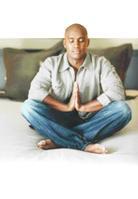John O'Connell, Contributor

In the lobby at Hult Health Education Center in Peoria, Illinois., 30 students form a circle, clear their minds and move as if in a dreamlike state to the peaceful sound of 'cello music and the calming voice of the instructor.
The students are practising tai chi, the art of moving meditation. It is exercise to instil balance, relieve stress and promote a healthy mind, body and spirit. Every Monday for eight weeks, the Peoria Park District class meets with instructor Ben Prichard to train in this form of exercise practised in China for more than 2,000 years.
It is the gentler side of martial arts without any explosive kicks, punches or physical contact. Tai chi, also spelled tai ji, consists of a set of slow, flowing motions called forms, which look more like dance than exercise. It is done using imagery and metaphors to inspire kinesthetic awareness.
As the class performs a movement, the instructor talks of lotus petals emerging from a pond. At one point in the movement, the class slowly gathers the petals on the pond, while at another point, they slowly push them away in a continuous movement.
Prichard said tai chi has 106 movements, ranging in various degrees of difficulty. Doing any one, Prichard said, requires proper balance, muscle control, concentration and deep, uniform breathing.
"The art of tai chi is the art of giving and receiving," Prichard said. "There is intrinsic energy all around us. With our movements, we are bringing energy into our body and letting it go. When we move energy through our bodies, it's called chi."
For fun and health
Carol Lowe is a veteran of many tai chi classes. She does it for fun and health. In addition to good exercise, she likes the meditative aspects of tai chi.
"The Chinese have been doing this forever," Lowe said. "In 1990, I was in Victoria Park in Hong Kong. There were all sorts of people doing their form of this exercise in the park. And I joined them."
For Joni Dennis, tai chi is a way of relieving stress from a busy day as a nurse.
"I sleep so well the night I take the class," Dennis said. "It's total relaxation."
Many benefits
There are reported health benefits to tai chi. An hour class is the equivalent exercise of walking a brisk mile with a low impact on the body, Prichard said.
Tai chi improves balance and flexibility, which helps reduce falls in elderly people. Research sponsored by the U.S. National Institute on Aging found that tai chi can significantly reduce the risk of falling for people over age 70.
In addition, a study from Johns Hopkins School of Medicine found tai chi can lower blood pressure. The study compared an aerobic exercise class with tai chi practitioners who worked out 30 minutes a day, four days a week. After 12 weeks, blood pressure had fallen an average of 8.4 millimeters of mercury in the aerobic exercise group, and seven millimeters of mercury in the tai chi group, according to an Associated Press story on the Johns Hopkins study.
Some propose tai chi as therapy for arthritis pain relief.
In times of grief
For Prichard, tai chi helped him heal from the deaths of his 15-year-old daughter, Nicole, and his son, Josh, 28. Prichard and his wife, Penny, reared two children who were severely mentally and physically handicapped.
Emotional wreck
"When my daughter died in 1993, I was an emotional wreck," Prichard said. "I was looking for something to help heal that emotional damage. I found it in tai chi. I took a Peoria Park district class taught by Jeanna Daykin in 1994. I enjoyed it from the very first class. For me, the benefits were immediate."
Prichard took many tai chi classes from Daykin. He eventually became her assistant. When Daykin stopped teaching the class in 2002, Prichard took over as instructor of the park district class.
"My son, Josh, died in 2004," Prichard recalled. "Naturally, it was a very tough time for my wife and me. But I was able to deal with my son's death much better than with the death of my daughter. We did a complete memorial service for my son. I couldn't have done that with my daughter. I credit tai chi with helping me become emotionally and physically stronger."
Prichard's tai chi classes attract college-age students to those in their '80s. Many students in the class have been taking tai chi classes from Prichard for the past two years.
✐ Visit Copley News Service at www.copleynews.com.
CXI
The murmuring of bees has ceased;
But murmuring of some
Posterior, prophetic,
Has simultaneous come,
The lower metres of the year,
When nature's laugh is done,
The Revelations of the book
Whose Genesis is June.
- Poems on nature by Emily Dickinson

